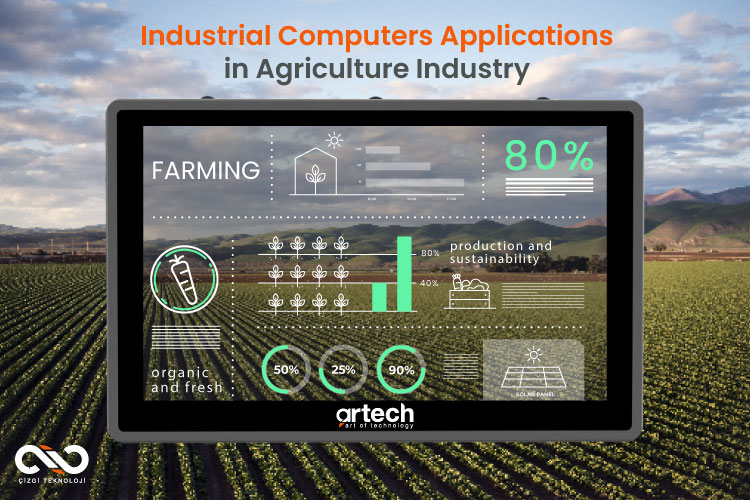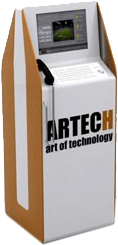Digital Transformation of Agriculture- The Role and Future of Industrial Computers

The agricultural sector needs new solutions for more significant and sustainable food production as the world population overgrows. This is where industrial computers come on the scene. Shaping the future of agriculture, this technology plays an influential role in every stage of food production, from the soil to our tables. In this article, we will examine this digital transformation in the agriculture industry and the vital role played by industrial computers.
The Role of Industrial Computers in the Agriculture Industry
Today's agricultural sector needs greater efficiency to feed a growing population and increase food production. Industrial computers are the perfect tool to respond to this need. They are potent devices optimised for various applications in the agricultural industry. Here are the main benefits of industrial computers in the farming sector:
Monitoring and Analysing Agriculture Data: Industrial computers play a significant role in continuously monitoring and analysing agriculture data. For example, an agribusiness can determine soil conditions through industrial computers that constantly monitor soil moisture. This allows irrigation systems to be adjusted automatically, thus optimising water use. At the same time, monitoring weather conditions can help predict future weather events. This allows agricultural businesses to make better decisions when planning harvests and other activities. Furthermore, long-term analysis of this data helps to develop strategies to improve soil quality and crop productivity.
Automatic Control and Process Optimisation: Industrial computers enable process optimisation by undertaking automatic control of agricultural equipment. For example, the speed and direction of a tractor can be precisely adjusted. This increases labour productivity while reducing fuel consumption. Furthermore, an industrial computer can monitor the maintenance requirements of farm equipment and predict breakdowns in advance. This helps businesses reduce costs and extend equipment life.
Product Tracking and Storage Control: Monitoring and storage of agricultural products is an essential post-harvest step. Industrial computers can monitor temperature, humidity and other conditions necessary to extend the shelf life of products. It can also minimise losses by optimising the transport process of products.
Spraying and Fertilisation: Controlling plant diseases and pests is an integral part of efficient agriculture. Industrial computers make these processes more precise and effective. Special software can adjust spraying and fertilisation processes according to the plant's needs. This reduces the use of chemicals, reducing the risk of environmental damage and cutting costs. For example, an industrial computer can analyse soil conditions in a particular region and apply fertiliser only where needed. This conserves natural resources and improves product quality.
Human Resources Management: Labour management is also a critical issue in the agricultural industry. Industrial computers can facilitate worker tracking, monitor worker performance and calculate worker salaries. This helps businesses to use labour resources more efficiently and fairly.
Supporting Sustainable Agriculture: Industrial computers are an essential part of sustainable agricultural practices. By continuously monitoring and analysing agricultural data, these devices contribute to more efficient use of resources. In addition, more precise and needs-based spraying and fertilisation processes reduce the use of chemicals and minimise the risk of environmental damage. This improves the sustainability of agriculture by saving land, water and energy. Industrial computers also optimise the tracking and storage of products, reducing waste and increasing the sustainability of the food chain. All these factors contribute to the agricultural industry's goal of providing healthier and sustainable food for future generations by utilising natural resources more efficiently.
Sustainability is an issue in which the agricultural sector will play a more significant role in the coming years. Industrial computers are an essential tool to achieve this goal and play an important role in shaping the future of agriculture in a more sustainable and environmentally friendly way.
Artech Industrial Computer Solutions
Artech industrial computer solutions are field-resistant, high-performance and long-lasting. Thanks to the reliability and durability of our solutions, agricultural businesses can operate in all kinds of harsh conditions.
Our industrial computing solutions offer excellent performance in collecting, analysing and processing agricultural data. They can be customised specifically for the needs of the farming sector. These devices can monitor all data in the field in real-time and transmit it to a central control unit. This allows agribusinesses to manage all their processes more effectively.
As Artech, we attach great importance to customer satisfaction and offer customised solutions to the needs of each of our customers. If you are ready to step towards a more sustainable and efficient future in the agricultural industry, click here to review our Artech Industrial Computer solutions.
Conclusion
The agricultural industry can move towards a more sustainable and efficient future as it begins to realise the benefits of industrial computers. Industrial computers can make a huge difference in various applications such as agricultural data monitoring, process optimisation, crop tracking, spraying, fertilisation and labour management.
Artech Industrial Computer Solutions is an excellent option for agribusinesses looking to be part of this technological transformation. This industry leader is making the future of agriculture brighter by delivering durability and high performance in the field. All stakeholders in the agricultural sector should recognise the benefits of industrial computing and embrace this technology more. By harnessing technology's power, the future's agriculture can be more efficient and sustainable.



 English
English
 TR
TR